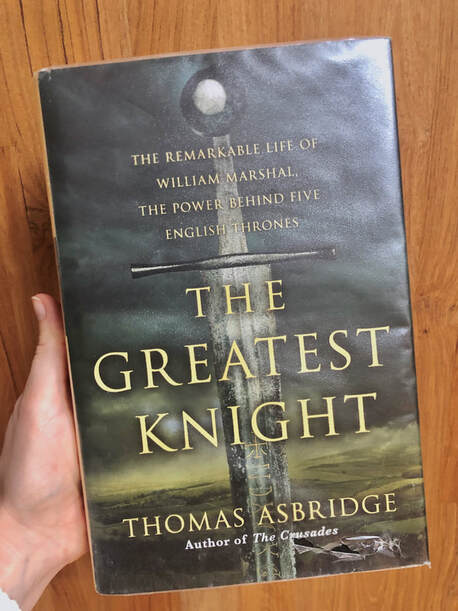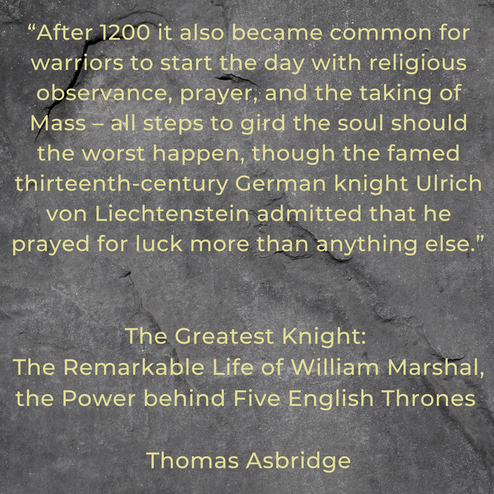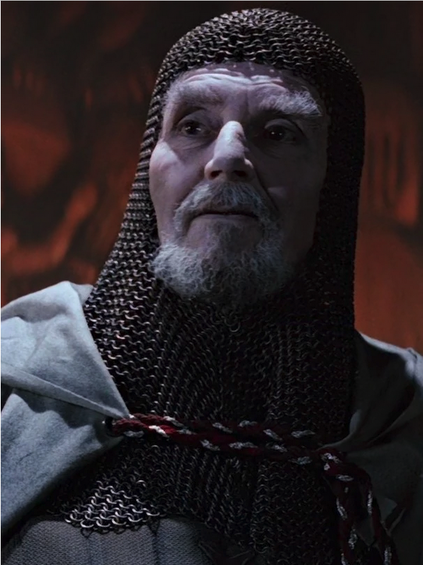The editor who reads too much |
|
When we think of knights, our imaginations conjure up armor, chivalry, and jousting, but what if that wasn’t the complete picture? Everything we know about the greatest knight, William Marshal (d. 1219) comes from an obscure, nearly lost copy of a medieval manuscript: History of William Marshal—now held in The Morgan Library, NYC. It’s a biography that was written in the 1220s, not long after his death, and it’s filled with details about Marshal’s life, given by his friends and contemporaries. Asbridge’s biography expands on the information from the medieval text, giving a more complete picture of the life and times of Marshal. I learned three important things I hadn’t known about the lives of knights in twelfth- and thirteenth-century England. First of all, early medieval jousting isn’t like what most people know it today: two men holding lances sit astride horses face off on a long track surrounded by bleachers of spectators. As their horses run at each other, they attempt to knock each other off. In Marshal’s time, jousting was more like playing at war. Huge groups of men would fight over a large area over the course of a whole day. The goal wasn’t to kill or maim but to take one another hostage. The ransoms paid included large amounts of money, armor, even the hostage’s horse. Marshal’s participation in these tournaments is how he made his name and fortune. As a boy, he was a younger son of the English king’s marshal, and he served an apprenticeship to become a warrior for a Norman knight. As he matured, he took risks and was well-rewarded for it, eventually becoming the first Earl of Pembroke. Second, the knight ‘dubbing’ ceremony as we know it today (the king using the flat end of the sword to make a man into a knight) didn’t become the ritual until over a century after Marshal’s own investiture. Another knight (not the king) would have given Marshal a cloak, a sword and some kind of blow to the body: either a hard knock or gentle tap on his head or shoulder, not the nice tap-tap we’re used to seeing. Finally, it was so incredibly satisfying to learn that Ulrich von Liechtenstein was an actual person. (If you don’t know who that is, please watch the cheesy but loveable 2001 romcom A Knight’s Tale.) “After 1200 it also became common for warriors to start the day with religious observance, prayer, and the taking of Mass – all steps to gird the soul should the worst happen, though the famed thirteenth-century German knight Ulrich von Liechtenstein admitted that he prayed for luck more than anything else.” Though religious observance was a part of life in a way we can’t imagine now, it’s nice to know they were wishing for luck just as much as we do today. Unfortunately, the film made Ulrich and Chaucer contemporaries, but Ulrich died at least ninety years before Chaucer was born. This is a nice reminder for historical fiction writers not to trust what you see in films and TV (or even from other historical writers!). It’s best to do your own research. Any writers looking for a good book on the warrior class of thirteenth-century England should read this one. “He chose . . . poorly. … You have chosen . . . wisely.” Anyone familiar with Indiana Jones and the Last Crusade will remember these lines. The man who speaks them is a gray-bearded knight in chainmail: this is always how I’ve imagined William Marshal, one of the greatest figures in twelfth- and thirteenth-century England. Title: The Greatest Knight: The Remarkable Life of William Marshal, the Power behind Five English Thrones.
Author: Thomas Asbridge. Publisher: Simon & Schuster Comments are closed.
|
Categories
All
Archives
July 2024
�
Posts on editing
Posts on books
Posts on publishing
Everything Else!
|



